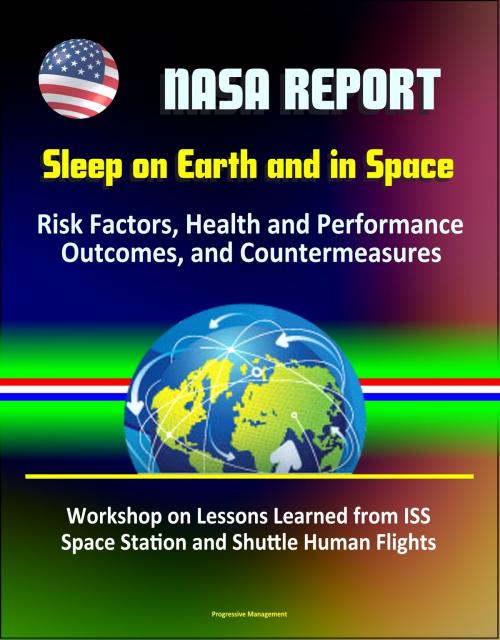NASA Report: Sleep on Earth and in Space: Risk Factors, Health and Performance Outcomes, and Countermeasures - Workshop on Lessons Learned from ISS Space Station and Shuttle Human Flights
Nonfiction, Science & Nature, Technology, Aeronautics & Astronautics, Health & Well Being, Health| Author: | Progressive Management | ISBN: | 9781310487491 |
| Publisher: | Progressive Management | Publication: | April 9, 2016 |
| Imprint: | Smashwords Edition | Language: | English |
| Author: | Progressive Management |
| ISBN: | 9781310487491 |
| Publisher: | Progressive Management |
| Publication: | April 9, 2016 |
| Imprint: | Smashwords Edition |
| Language: | English |
This excellent report has been professionally converted for accurate flowing-text e-book format reproduction. The workshop goals were to:
Review state-of-the-art knowledge of the effects of environmental factors on sleep; Review state-of-the-art knowledge of the effects of sleep or insufficient sleep on multiple physiological and psychological functions; Encourage inter-disciplinary work, including countermeasure development, on these topics; and Provide information for a report to NASA and amendments to the NASA Evidence Book on relevant topics. Presenters were requested to address the following overarching issues: What are evidence-based thresholds or dose-response relationships for the duration of sleep, the quality of sleep, and/or the timing of sleep on health and performance outcomes in space and on Earth? What are the known and potential acute and chronic effects of inadequate sleep duration, timing, and/or reduced sleep quality on health and performance outcomes during prolonged spaceflight? This includes the time constants for effects over weeks and months of reduced sleep duration or quality, as well as what is known about recovery rates and recycle dynamics (i.e., repeated periods of sleep restriction and recovery)? Are there phenotypic (trait-like and stable) differences among people in vulnerability to the effects of sleep loss and/or sleep quality on health and performance outcomes? If so, are there biomarkers for these differences? What are the appropriate measures and metrics (a) for sleep duration and quality, and (b) to establish the effects of sleep deficit on health and performance outcomes? When achieved sleep falls below desired levels, what mitigating strategies and countermeasures for health and performance outcomes can be used?
This excellent report has been professionally converted for accurate flowing-text e-book format reproduction. The workshop goals were to:
Review state-of-the-art knowledge of the effects of environmental factors on sleep; Review state-of-the-art knowledge of the effects of sleep or insufficient sleep on multiple physiological and psychological functions; Encourage inter-disciplinary work, including countermeasure development, on these topics; and Provide information for a report to NASA and amendments to the NASA Evidence Book on relevant topics. Presenters were requested to address the following overarching issues: What are evidence-based thresholds or dose-response relationships for the duration of sleep, the quality of sleep, and/or the timing of sleep on health and performance outcomes in space and on Earth? What are the known and potential acute and chronic effects of inadequate sleep duration, timing, and/or reduced sleep quality on health and performance outcomes during prolonged spaceflight? This includes the time constants for effects over weeks and months of reduced sleep duration or quality, as well as what is known about recovery rates and recycle dynamics (i.e., repeated periods of sleep restriction and recovery)? Are there phenotypic (trait-like and stable) differences among people in vulnerability to the effects of sleep loss and/or sleep quality on health and performance outcomes? If so, are there biomarkers for these differences? What are the appropriate measures and metrics (a) for sleep duration and quality, and (b) to establish the effects of sleep deficit on health and performance outcomes? When achieved sleep falls below desired levels, what mitigating strategies and countermeasures for health and performance outcomes can be used?















